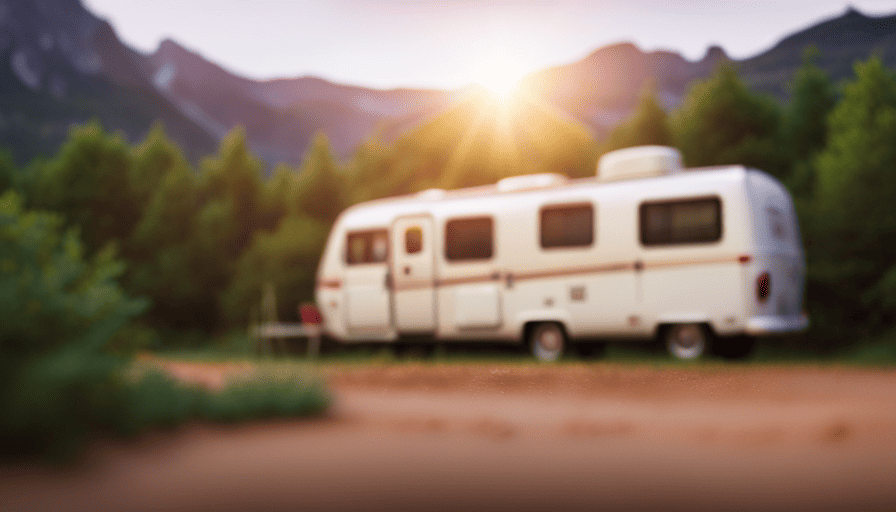Have you ever experienced being parked in a stunning campground, immersed in the beauty of nature, only to be met with an unwelcome surprise? Imagine this scenario: as you open the door to your camper, looking forward to a moment of relaxation, you are suddenly overwhelmed by a foul smell. It doesn’t take long for you to determine that the culprit behind this unpleasant odor is none other than your black water tank.
But what exactly is black water in a camper, and why is it such a cause for concern?
In this article, we will delve into the world of camping waste management and explore the ins and outs of black water in campers. We’ll explain its composition, discuss the importance of proper disposal, and provide tips for maintaining a clean and odor-free black water tank.
Additionally, we’ll address the health and environmental concerns associated with black water, as well as the regulations and best practices for its disposal.
So, whether you’re a seasoned camper or a newbie exploring the great outdoors, read on to discover everything you need to know about black water in a camper. Before we get into the nitty-gritty details, it’s important to understand that black water in a camper refers to the waste water from the toilet. This is often stored in a separate tank and requires proper disposal to avoid any contamination. When dealing with black water in a camper, one important maintenance task is removing black spots from rubber roof. This can be done using specific cleaning products and techniques to ensure the longevity of your camper’s roof.
Key Takeaways
- Black water in a camper is waste from toilets and contains human feces, toilet paper, and harmful bacteria.
- Proper disposal of black water is important to prevent odors, pests, and health and environmental risks.
- Differentiating between black water and gray water is crucial for waste management in campers.
- Black water should be disposed of at designated dump stations or sewer connections to prevent contamination of surrounding areas and water sources.
Understanding the Basics of Camping Waste Management
Camping waste management may not sound glamorous, but it’s crucial to understand the basics, including dealing with black water in your camper.
When it comes to camping waste disposal, one of the main concerns is the proper handling of human waste. Most campers are equipped with portable toilets, which are designed to collect both black water and gray water.
Black water, in the context of camping waste, refers to the waste generated from toilets and contains human feces. It is called black water because of its appearance and odor. Dealing with black water requires a responsible and hygienic approach. To dispose of black water, campers should use designated dump stations or facilities specifically designed for this purpose. These facilities are equipped with proper plumbing and waste treatment systems to ensure the safe handling and disposal of black water.
Differentiating between gray water and black water is essential when it comes to camping waste management. Gray water refers to the wastewater generated from sinks, showers, and dishwashing. It does not contain human waste and is generally considered less harmful. Understanding the difference between the two will help campers adopt appropriate disposal techniques and maintain a clean and healthy camping environment.
With this understanding, let’s explore the different ways to manage black water in your camper.
Differentiating Between Gray Water and Black Water
Differentiating between gray water and the unmentionable liquid in a camper is like distinguishing between a gentle breeze and a hurricane. While both types of wastewater are produced in a camper, they have distinct characteristics and require different management strategies.
Gray water refers to the relatively clean wastewater that comes from the sinks, showers, and washing machines in a camper. It contains soaps, detergents, and food particles, but doesn’t include human waste. Gray water can be safely disposed of in designated areas or used for irrigation, as long as it doesn’t come into contact with edible plants.
On the other hand, black water is the term used to describe the waste that comes from the toilet in a camper. It contains human waste, toilet paper, and potentially harmful bacteria. Black water must be properly contained and disposed of in designated dump stations or sewage systems to prevent contamination and potential health risks.
Understanding the difference between gray water and black water is crucial for responsible camping waste management. It ensures that we minimize the environmental impact and potential health risks associated with improper disposal.
Now, let’s delve into what exactly black water is in a camper.
What Exactly is Black Water in a Camper?
Imagine a foul-smelling, bacteria-laden liquid that originates from the toilet in a mobile home. This is what we commonly refer to as black water in a camper. Understanding black water management is essential for anyone who owns or uses a camper.
Black water is different from gray water, which comes from sinks and showers. It contains human waste, toilet paper, and water used for flushing. Due to the potential health hazards associated with black water, it’s crucial to dispose of it properly.
Proper disposal of black water involves using designated dump stations or sewer connections at campsites. These facilities are equipped to handle the safe disposal of black water. It’s essential to follow all regulations and guidelines when emptying the black water tank to prevent contamination and protect the environment. Additionally, using biodegradable toilet paper and environmentally-friendly cleaning products can help minimize the impact on the surrounding ecosystems.
Understanding the sources and composition of black water is the next step in effectively managing it in a camper.
The Sources and Composition of Black Water
Understanding the origins and makeup of this unpleasant liquid is crucial for effective management in a mobile home. Black water in a camper is primarily sourced from two main contributors: toilets and kitchen sinks. These sources can include various waste materials such as human waste, toilet paper, food scraps, and cleaning chemicals.
The composition of black water is a combination of solid waste, liquid waste, and water. It can contain harmful bacteria, viruses, and other pathogens that pose health risks if not properly handled.
To give you a better understanding, here are four key components found in black water:
- Fecal Matter: The solid waste produced by humans and animals, which can carry harmful bacteria and parasites.
- Toilet Paper: The paper used for personal hygiene purposes, which adds to the overall volume of waste.
- Food Scraps: Leftover food particles that are rinsed down the kitchen sink, contributing to the organic content of black water.
- Cleaning Chemicals: Residual chemicals from cleaning agents used in the toilet or sink, which can be harmful if not diluted properly.
Proper disposal of black water is of utmost importance to maintain a hygienic and healthy living environment in a camper. By following the correct procedures, we can ensure the safety of ourselves and others, as well as protect the environment from contamination.
The Importance of Proper Black Water Disposal
Properly disposing of this unpleasant liquid is crucial for maintaining a hygienic and healthy living environment in a mobile home, ensuring the safety of ourselves and others, and protecting the environment from contamination. The importance of proper black water disposal cannot be overstated.
Improper disposal can lead to a range of health and environmental concerns. When black water is not disposed of correctly, it can create unpleasant odors, attract pests, and pose a risk of disease transmission. Bacteria, viruses, and harmful chemicals present in black water can contaminate the surrounding areas and water sources if not handled properly. This can result in the spread of diseases and ecological damage.
To prevent these issues, it is essential to use appropriate black water management systems in campers. Common systems include holding tanks, portable waste tanks, and sewer connections. These systems allow for the safe containment and disposal of black water. Regular maintenance and cleaning of these systems are necessary to ensure their effectiveness and prevent any potential health or environmental issues.
The importance of proper black water disposal cannot be emphasized enough. It is crucial for maintaining a clean and healthy living environment, protecting ourselves and others from potential health risks, and preserving the environment.
Now let’s explore the different common black water management systems in campers.
Common Black Water Management Systems in Campers
If you want a hassle-free camping experience, make sure to utilize the various systems available for managing waste in your mobile home. Here are four common black water management systems that can help you maintain a clean and odor-free camper:
-
Black Water Tanks: Most campers come equipped with black water storage tanks, which collect waste from the toilet. These tanks are designed to hold and store the waste until it can be properly disposed of.
-
Chemical Treatments: To prevent odors and break down waste in the black water tank, chemical treatments can be added. These treatments help to control bacteria growth and minimize unpleasant smells.
-
Rinse Systems: Some campers have built-in rinse systems that allow you to flush out the black water tank with fresh water. This helps to remove any leftover waste and keeps the tank clean.
-
Portable Waste Tanks: For campers without built-in black water storage, portable waste tanks can be used. These tanks can be easily transported to a dumping station for disposal.
By utilizing these common black water storage and treatment options, you can ensure a more pleasant camping experience. In the next section, we’ll provide tips for maintaining a clean and odor-free black water tank, so you can continue enjoying your time on the road without any worries.
Tips for Maintaining a Clean and Odor-Free Black Water Tank
To keep your waste storage system fresh and odor-free, regular tank maintenance is essential. Maintaining tank cleanliness is crucial in preventing odor buildup and ensuring a pleasant camping experience. Here are some tips to help you maintain a clean and odor-free black water tank.
First, always use RV-specific toilet paper to avoid clogs and promote better tank cleanliness. This type of toilet paper breaks down more easily in water and reduces the risk of blockages. Additionally, be mindful of what you flush down the toilet and avoid putting non-biodegradable items into the tank.
Regularly flushing and rinsing the tank is also important. After emptying the tank, fill it with water and add a tank cleaner or deodorizer that’s specifically designed for black water tanks. Let it sit for a few hours or overnight, then flush the tank again to remove any remaining residue.
Furthermore, periodically cleaning the tank’s sensors can help prevent false readings and ensure accurate level monitoring. Use a soft brush or sponge to gently clean the sensors while taking care not to damage them.
By following these tips, you can maintain a clean and odor-free black water tank. Proper maintenance not only enhances your camping experience but also helps protect your health and the environment.
Health and Environmental Concerns Related to Black Water
Maintaining a clean and odor-free black water tank is crucial for a pleasant camping experience. However, it’s also important to consider the health and environmental concerns associated with black water.
When it comes to health concerns, exposure to black water can lead to various illnesses. Bacteria, viruses, and parasites present in the waste can cause gastrointestinal infections, respiratory problems, and skin infections. It’s essential to handle black water with care, wearing protective gloves and following proper hygiene practices to minimize the risk of contamination.
From an environmental perspective, the disposal of black water can have a significant impact. Improper disposal can contaminate water sources and harm aquatic life. The chemicals used in black water treatments can also have adverse effects on the environment if not disposed of properly.
To mitigate these concerns, it’s crucial to follow black water disposal regulations and best practices. This includes using designated dumping stations, avoiding dumping black water on the ground, and using environmentally-friendly black water treatment products. By adhering to these guidelines, we can ensure the health and safety of both ourselves and the environment.
Now, let’s explore the regulations and best practices for black water disposal.
Black Water Disposal Regulations and Best Practices
When it comes to disposing of your waste, it’s important to follow the rules and guidelines set in place to protect both the environment and your fellow campers, just like following the traffic laws to keep everyone on the road safe.
Black water disposal regulations are in place to ensure that waste from campers is properly managed and does not pose a risk to public health or the environment.
Different countries and regions have specific regulations regarding the disposal of black water. These regulations typically require campers to use designated dump stations or facilities to empty their black water tanks. Dump stations are equipped with appropriate infrastructure to safely handle and treat black water waste. It is crucial to familiarize yourself with the regulations specific to your camping location and to follow them diligently.
In addition to following regulations, there are best practices that can help minimize the impact of black water disposal. Using environmentally friendly and biodegradable toilet paper is recommended to promote decomposition. It is also important to use proper chemicals or natural additives in the black water tank to control odors and break down waste efficiently.
By adhering to black water disposal regulations and implementing best practices, we can ensure the responsible management of waste while enjoying our camping experience. Now, let’s move on to frequently asked questions about black water and campers.
Frequently Asked Questions About Black Water and Campers
Got any burning questions about managing waste while camping? Let’s dive into some common queries about black water and campers!
When it comes to black water regulations, it’s important to know the guidelines to ensure a clean and safe camping experience. Firstly, always check the local regulations regarding black water disposal before heading out on your trip. Different states and campgrounds may have varying rules and restrictions in place.
Additionally, it’s crucial to properly maintain your black water tank to prevent any issues. Regularly emptying and cleaning the tank is essential to prevent odors and blockages. Using biodegradable toilet paper and a tank treatment can also help keep the tank clean and functioning properly. Be sure to monitor the tank’s levels throughout your trip and plan for regular dump station visits.
Remember, proper black water management not only ensures a pleasant camping experience for you, but also helps protect the environment. So, follow the regulations and maintain your black water tank for a worry-free camping adventure!
Frequently Asked Questions
Can black water be recycled or reused?
Absolutely! While it may seem like an impossible task, recycling or reusing black water is not only feasible but also incredibly beneficial for our environment.
Recycling options such as advanced filtration systems and chemical treatments can effectively turn black water into clean, reusable water. By doing so, we drastically reduce the environmental impact of waste disposal, conserve water resources, and promote a more sustainable future. It’s truly a game-changer in the world of waste management!
How often should the black water tank be emptied?
To properly clean a black water tank in a camper, it’s important to know how often it should be emptied. Signs of a full black water tank include slow draining or backing up of the toilet, foul odors, or the tank level indicator showing full. It’s recommended to empty the black water tank at least once a week for regular maintenance. However, the frequency may vary depending on the size of the tank and the number of people using the camper. Proper cleaning procedures should be followed to ensure hygiene and prevent any issues.
Can I dump black water in any regular toilet?
Dumping black water from a camper into a regular toilet is not recommended because most regular toilets are not designed to handle the contents of a black water tank, which can include waste and chemicals. This could potentially damage the plumbing system and cause blockages. Additionally, dumping black water into a regular toilet can have a negative environmental impact, as the sewage treatment process is not equipped to handle these types of waste. It’s best to use designated dump stations for proper disposal.
Are there any alternatives to black water tanks?
There are alternatives to black water tanks in campers. Composting toilets are a popular option for those looking for a more environmentally friendly solution. These toilets use natural processes to break down waste into compost, which can be safely disposed of.
Another option is portable waste bags, which are designed to collect and contain waste for easy disposal. Both of these alternatives offer convenience and can be used as an alternative to traditional black water tanks.
What precautions should be taken when handling black water?
When handling black water in a camper, it’s crucial to take necessary precautions and follow safety measures to ensure cleanliness and avoid any health risks. Firstly, wearing protective gloves and clothing is essential to prevent direct contact with the waste.
Secondly, proper disposal methods should be followed, such as using designated dump stations and avoiding any spillage.
Lastly, regular cleaning and sanitization of the black water tank is important to maintain hygienic conditions.
Can a Camper Hat Protect Against Black Water in a Camper?
The camper hat style and features can provide some protection against black water in a camper. While it may not offer complete safeguard, the hat’s brim can shield your face from splashes. Remember to prioritize proper hygiene and sanitation measures to minimize the risk of exposure to harmful substances like black water.
Conclusion
In conclusion, understanding and properly managing black water in a camper is essential for a clean and enjoyable camping experience. By differentiating between gray water and black water, campers can effectively dispose of waste and maintain a hygienic environment.
One interesting statistic to note is that, according to a study conducted by the National Park Service, improper disposal of black water can contaminate water sources and lead to the closure of campsites. This highlights the importance of following regulations and best practices for black water disposal to protect both our health and the environment.










